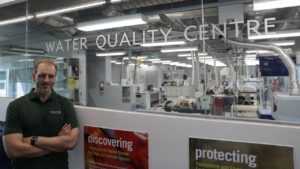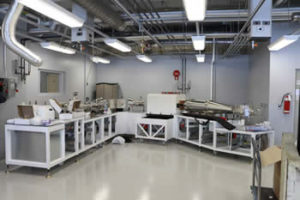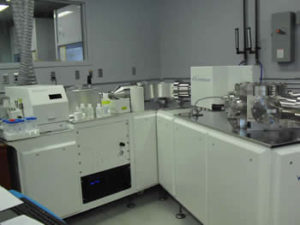Testing the Waters (and almost everything else too): Trent’s Water Quality Centre gets a new director
Trent University’s Water Quality Centre (WQC), renowned as Canada’s most comprehensive mass spectrometry facility, will continue to blow its competitors out of the water with increased offerings and the leadership of its newly appointed director, Dr. Paul Szpak, Canada research chair in Environmental Archaeology and Anthropology professor at Trent.
Read the full story here!

“I am truly standing on the shoulders of giants, like Dr. Chris Metcalfe, Dr. Doug Evans and Dr. Peter Dillon, to name a few,” says Professor Szpak. “I’m excited to see the Centre’s service offerings grow into new research areas by augmenting the use of our existing instrumentation, applying new technologies and developing new methods of analysis.”
Prof. Szpak is a leader in research using stable isotope analyses and has been using the instrumentation in the WQC to learn more about past environments and how humans interacted with and impacted these environments, with a particular emphasis on the analysis of archaeological materials.
Offering a wide scope of services

The instrumentation and analytical services offered through the WQC spans beyond work relating to water.
Researchers from across the University, including those in the fields of Forensics, Biology, Chemistry, Anthropology and the School of the Environment, make use of the state of-the-art equipment housed in the Centre.
Here they analyze a variety of organic materials, such as food products, plants, invertebrates, bird eggs and feathers, fur, sediments, soils, fly ash, municipal wastewaters, process waters, and industrial by-products, as well as inorganic materials, such as metals. And yes, the Centre analyzes water samples too!
“We also host a lot of graduate students using our equipment for their research, as well as a few undergraduate students who are involved in thesis projects,” says Prof. Szpak. “In addition, students in our Master of Instrumental Chemical Analysis program gain extensive hands-on experience on operating and repairing instruments, which is a key component of the program.”
Unparalleled instrumentation

Spanning two laboratories on Trent’s Symons Campus, the WQC currently houses 13 mass spectrometers, including the Bruker SolariX XR (eXtreme Resolution), one of only a few such mass spectrometers in the world.
This “super high resolution” instrument is capable of up to 10 million resolution, allowing for highly detailed analysis and accuracy.
Another rare find in the WQC is the Plasma 1700, used for heavy isotope analyses in applications such as examining the origins of the solar system. With a 4 x 4 m2 footprint, this instrument enables the WQC to tackle extremely demanding applications that cannot be performed on other instruments.
With its unique, highly sophisticated instrumentation, the WQC is an ideal partner for government, industry and other universities that require analytical services or training.
Visit the Water Quality Centre website for more information on this state-of-the-art facility.

